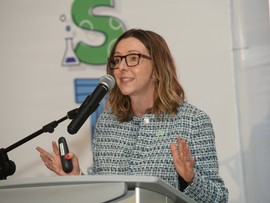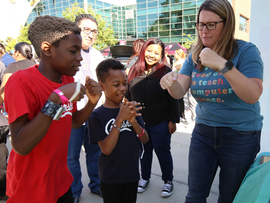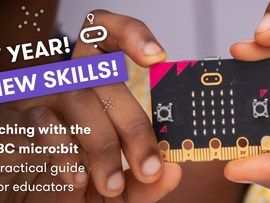Working with Google Blockly to transform coding accessibility
With major funding from the Blockly Accessibility Fund, we aim to improve and transform the accessibility of block-based coding over the next three years.
Across the world, many children live with disabilities or additional support needs. Our mission is to inspire every child to create their best digital future, so it is important to ensure that all children can access digital education equally. In doing so, more children with a range of experiences and needs can be inspired to become digital creators in the future.
Accessing block-based coding
Our earlier research, as part of a wider accessibility project generously funded by Nominet, highlighted barriers to using Microsoft MakeCode for some users with disabilities. Block-based coding within MakeCode is not currently accessible to individuals with dexterity or visual impairments, who rely on keyboards, screen readers and other assistive technology to access content. This is important, because block-based coding is a popular method to introduce and teach coding to children, which means some children are missing out.
Blockly is the technology behind MakeCode and other block-based coding platforms, including Scratch and Code.org. The Blockly team at Google want to incorporate keyboard navigation and screen reader compatibility, so that all platforms built with Blockly can become more accessible. However, this is complex because it requires a lot of research and testing with experts, teachers and students to find intuitive and flexible solutions to fulfil the users’ needs. Careful integration into MakeCode, and other platforms, is also critical to provide a seamless user experience.
A new transformative project
Demonstrating their commitment to accessibility, Google launched the Blockly Accessibility Fund and we are delighted to announce that we have been given $1 million to work with the Blockly team, MakeCode team, and the wider community, to improve accessibility in block-based coding.
For both keyboard navigation and screen reader integration, we will support Blockly with research at multiple stages, keeping users at the heart of the project. This will include gathering input from experts, teachers and students. We will then integrate the solutions into MakeCode, working in partnership with the MakeCode team. We will include other related support for these users to help them and their teachers use block-based coding in MakeCode.
We are aiming for MakeCode to be ready to launch keyboard navigation in the summer of 2025 and screen reader compatibility in summer of 2026 in the micro:bit version of MakeCode.
This work will enable not just MakeCode but other Blockly users (some who have also received funding from the Blockly Accessibility Fund) to integrate these features too. In addition, it will allow special interfaces to be created for children who use switches, voice or eye control.
Towards coding for every child

Google.org is proud to support Micro:bit Educational Foundation with the Blockly Accessibility Fund in their pursuit to make coding more accessible. We look forward to the future impact they drive with this support from Google.org.

Joe Davis, Product Innovation Leader at Google.org
We are excited that this work will ultimately lead to much better access to block-based coding for a wider range of children.
Our commitment to accessibility is ongoing. Outside this project, we continue to look for opportunities to support all types of people, including those with physical disabilities, neurodiversity or specific educational needs.
If you are interested in supporting this work or getting involved, find out more and get in touch.


